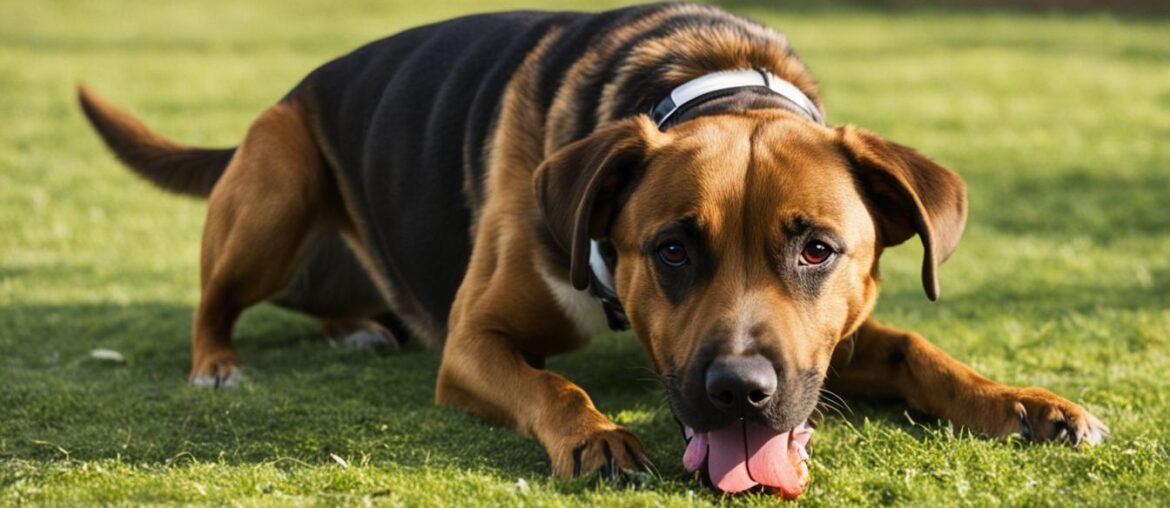As a dog owner, you may have witnessed your furry friend engaging in some interesting behaviors. One behavior that can be a cause for concern, or even embarrassment, is when dogs lick their private parts. While it may seem peculiar to us humans, this behavior actually serves a purpose in their normal grooming routine. To understand why dogs engage in this behavior, it’s important to delve into their canine habits and animal instincts.
Dogs, both male and female, use licking as a way to keep their genital area clean after eliminating waste. It’s a natural part of their grooming behavior, similar to how we humans take care of our personal hygiene. However, excessive or sustained licking in the urogenital area may indicate a medical issue that requires attention from a veterinarian. It’s important to be aware of signs such as swelling, redness, presence of pustules or red bumps, discoloration of the skin, and abnormal urination patterns.
So, is it ever acceptable for dogs to lick their private parts? In the context of normal grooming behavior, a moderate degree of licking is considered acceptable. Dogs may lick themselves after urinating to clean their genital area. This type of licking is brief and not persistent. It’s important to differentiate between normal grooming behavior and excessive or sustained licking that may indicate an underlying medical problem.
If your dog’s licking behavior becomes excessive or persistent, it’s essential to consider whether there is an underlying health issue. Common reasons for excessive crotch licking include urinary tract infections, allergies, yeast infections, anal gland impaction, and vaginitis. Recognizing the signs associated with these conditions, such as swelling, frequent urination, scooting, discharge, foul odor, and skin rash, can help you determine if your dog needs veterinary attention.
It’s important to emphasize that dogs lick their private parts as a natural instinct to stay clean. Unlike humans, who have various means of personal hygiene, dogs rely on licking to keep their genital area free from dirt and discharge. Accepting this behavior as normal canine behavior can help pet owners understand and appreciate their pets’ natural instincts.
When dealing with excessive crotch licking, it’s crucial to address any potential health issues. Blocked anal glands, allergies, regular deworming, and seeking professional animal behavior help are all important considerations. By taking a comprehensive approach to your dog’s well-being, you can ensure their comfort and happiness.
Key Takeaways:
- Dogs licking their private parts is a normal grooming behavior.
- Excessive or sustained licking may indicate an underlying medical problem.
- Signs of a potential problem include swelling, frequent urination, scooting, and foul odor.
- Common medical reasons for excessive licking include urinary tract infections, allergies, and anal gland impaction.
- Accepting and understanding this behavior is key to ensuring your dog’s overall well-being.
Is Licking Private Parts Ever Acceptable?
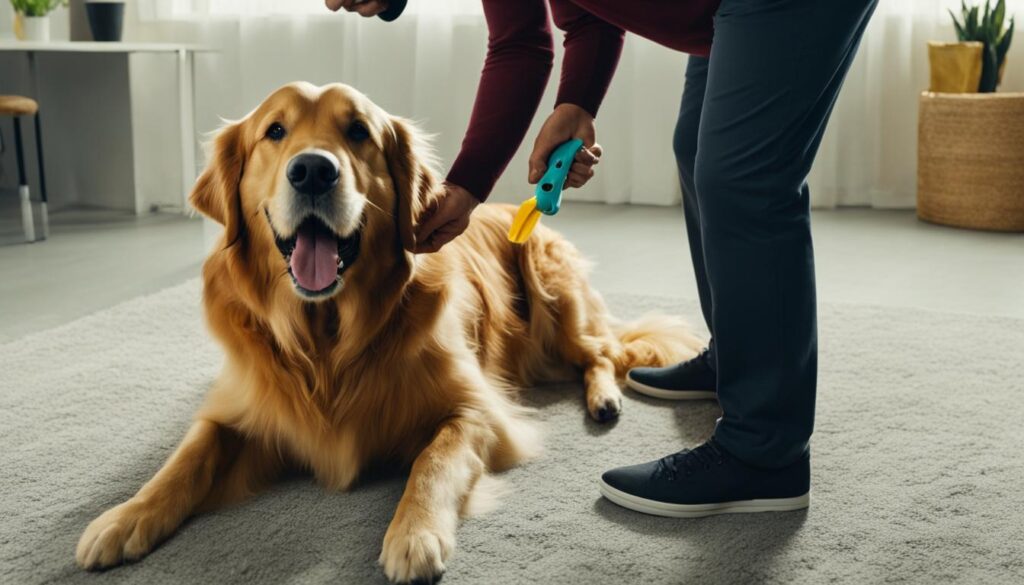
In the dog world, a moderate degree of licking the urogenital area is considered normal grooming behavior. Dogs may lick their private parts after urinating to clean the area. This type of licking is brief and not persistent. It is also not as common for dogs to lick the anal area after eliminating, unless the stool is sticky or watery. Normal, firm bowel movements do not typically require licking. So, while it may seem embarrassing to pet owners, in the context of normal grooming behavior, licking private parts is acceptable.
Regular grooming is essential for maintaining a dog’s hygiene. This includes cleaning their fur, ears, teeth, and yes, even their private parts. Just like humans washing our hands after using the bathroom, dogs have their own way of staying clean. Licking their private parts after urinating serves the purpose of removing any residual urine or other fluids. It’s a natural behavior deeply rooted in their instincts.
It’s important to emphasize that normal grooming behavior in dogs should not be perceived as inappropriate or unsanitary. Dogs are not concerned about the social stigma or embarrassment that humans may associate with this behavior. They are simply following their natural instincts to keep themselves clean and healthy.
While it’s understandable that some pet owners may find this behavior uncomfortable or awkward, it’s crucial to remember that dogs have different hygiene practices than humans. Accepting and respecting their grooming behaviors is important for building a trusting and harmonious relationship with our furry friends.
Importantly, excessive or prolonged licking of the private parts may indicate an underlying medical issue or discomfort that requires attention. If you notice any signs of irritation, inflammation, redness, swelling, discharge, or a foul odor associated with your dog’s private parts, it’s advisable to consult a veterinarian for a thorough examination and appropriate treatment.
Benefits of Natural Grooming Behavior:
- Keeps the genital area clean and free from fluid residue.
- Maintains a healthy pH balance in the urogenital region.
- Prevents the accumulation of harmful bacteria or other pathogens.
- Reduces the risk of skin infections or irritation in sensitive areas.
- Helps dogs feel comfortable and hygienic, promoting their overall well-being.
When to Seek Veterinary Care:
If your dog’s private area appears swollen, red, inflamed, or if your dog is excessively licking or exhibiting signs of discomfort, it’s essential to consult a veterinarian. A veterinary professional will be able to assess the situation, perform necessary tests, and provide appropriate treatment to address any underlying health issues.
Common Medical Conditions:
Excessive crotch licking can be indicative of various medical conditions, including urinary tract infections, allergies, yeast infections, impacted anal glands, or vaginitis. These conditions can cause discomfort, itching, inflammation, and other symptoms that prompt dogs to excessively lick their private parts. Identifying and treating the underlying cause is crucial for providing relief and improving your dog’s quality of life.
Differences Between Normal and Excessive Crotch Licking
| Normal Grooming Behavior | Excessive Licking |
|---|---|
| • Brief licking after urinating to clean the area | • Persistent and prolonged licking |
| • Occasional licking of the anal area if stool is sticky or watery | • Excessive licking of the anal area regardless of stool consistency |
| • Licking stops when the area is clean | • Continual licking, even when the area is already clean |
| • No signs of irritation or discomfort | • Signs of inflammation, redness, swelling, or discharge |
When is licking private parts considered a problem?
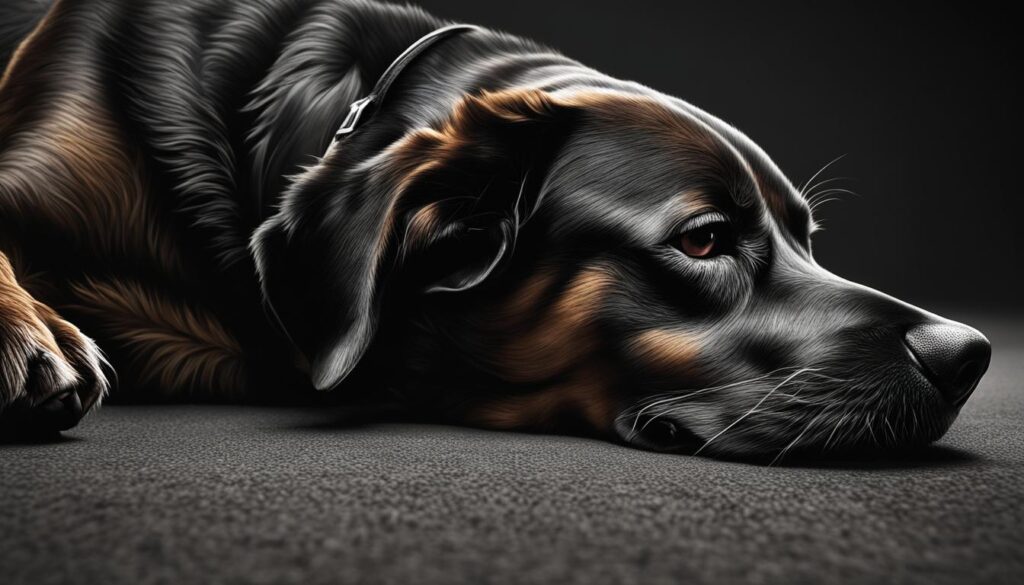
Frequent or sustained licking of the urogenital area may indicate a medical problem. Pet owners should be alert for signs such as swollen or red genital or anal regions, presence of pustules or red bumps on the skin, discoloration of the skin, straining to urinate, increased frequency of urination, scooting or rubbing the rectal area, foul odor between eliminations, and discharge from the genitals. If any of these signs are present, it is recommended to consult a veterinarian for further evaluation and potential treatment.
| Signs | Description |
|---|---|
| Swollen or red genital or anal regions | Indicates inflammation or infection |
| Pustules or red bumps on the skin | Suggests skin irritation or infection |
| Discoloration of the skin | May indicate underlying skin condition |
| Straining to urinate | Potential urinary tract issue |
| Increased frequency of urination | Symptom of urinary problem |
| Scooting or rubbing the rectal area | Sign of anal gland issue or irritation |
| Foul odor between eliminations | Indicates infection or abnormal discharge |
| Discharge from the genitals | Potential infection or reproductive issue |
What Causes These Signs Associated with Licking?
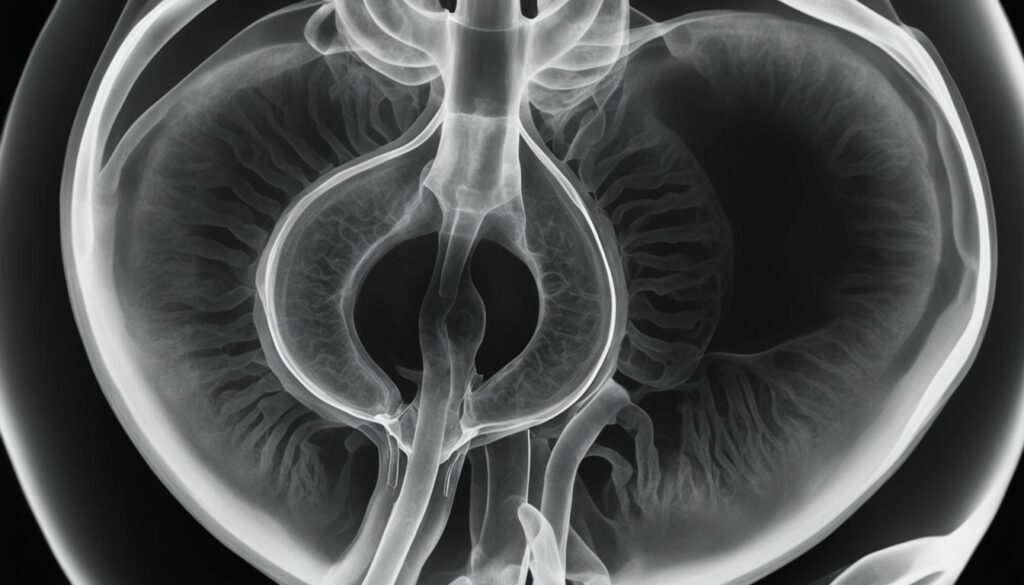
Excessive licking of the genital or anal regions in dogs can be attributed to various medical reasons. These conditions can cause discomfort, itching, pain, and inflammation, leading to persistent licking. Some common medical causes include:
1. Urinary Tract Infection (UTI)
A UTI occurs when bacteria enter and multiply in the urinary tract, leading to inflammation and irritation. Dogs with UTIs may exhibit symptoms such as frequent urination, straining while urinating, and blood in the urine. This discomfort can trigger excessive licking in an attempt to alleviate the pain.
2. Bladder Stones or Crystals
Bladder stones or crystals are mineral formations that can accumulate in a dog’s bladder. These formations can cause irritation and inflammation, resulting in frequent urination and discomfort. Dogs may resort to excessive licking of the genital area as a response to this discomfort.
3. Allergies (Food and Environmental)
Allergies can manifest as skin irritations and inflammation in dogs. Both food and environmental allergies can cause itching and discomfort in the genital area, leading to excessive licking. Identifying and managing the underlying allergens is crucial to reduce the urge to lick.
4. Skin Infections (Bacterial or Yeast)
Infections caused by bacteria or yeast can develop in the skin around the genital or anal regions. These infections can cause itching, redness, and inflammation, prompting dogs to lick excessively in an effort to relieve the discomfort. Treating the underlying infection is essential to alleviate the need for excessive licking.
5. Anal Gland Impaction
The anal glands, located on either side of a dog’s anus, can become impacted or infected. This condition can cause discomfort and pain, leading to excessive licking or scooting. In severe cases, surgical removal of the anal glands may be necessary to relieve the dog’s discomfort.
Understanding the medical reasons behind excessive licking is crucial in addressing the underlying issues and providing the necessary treatment. Different conditions may require specific interventions such as antibiotics, special diets, topical treatments, or even surgical procedures. Consulting a veterinarian is recommended to accurately diagnose and treat the underlying cause of persistent licking.
| Medical Reasons | Symptoms |
|---|---|
| Urinary Tract Infection (UTI) | Frequent urination, straining while urinating, blood in the urine |
| Bladder Stones or Crystals | Discomfort, frequent urination |
| Allergies (Food and Environmental) | Itching, skin irritations |
| Skin Infections (Bacterial or Yeast) | Itching, redness, inflammation |
| Anal Gland Impaction | Discomfort, pain, scooting |
Dogs lick their crotch to stay clean
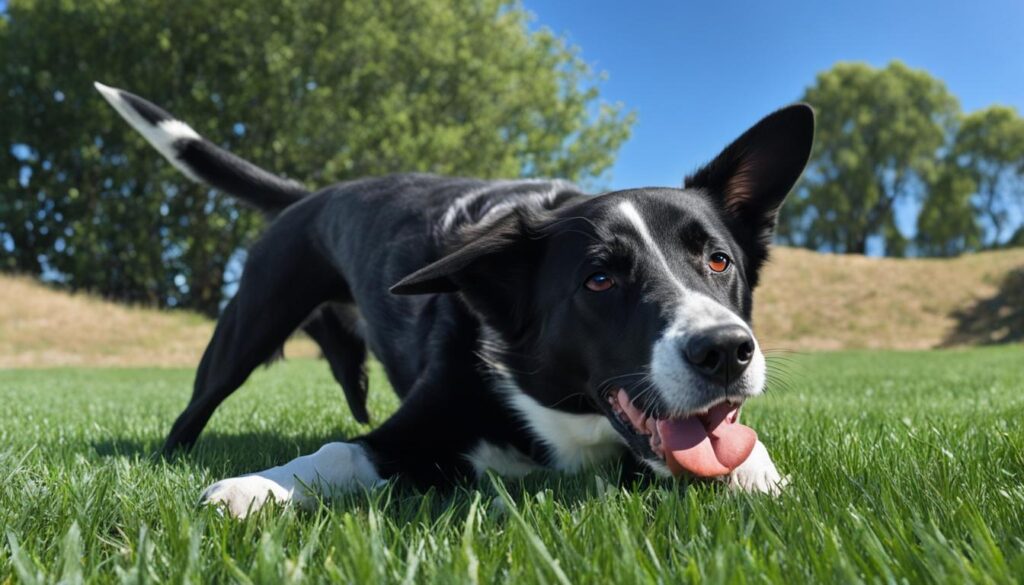
Dogs have a natural grooming instinct, and licking their crotch is a part of that behavior. Just like how they lick their paws, legs, and body, dogs use their tongue to clean their genital area to stay clean and maintain hygiene. While it may seem unusual to humans, dogs don’t have the luxury of using toilet paper. Licking is their way of keeping their private parts free from dirt and discharge.
Unlike humans, dogs are not concerned about social stigma or embarrassment associated with this behavior. They simply view it as a normal part of their grooming routine. Accepting this behavior as natural canine behavior can help pet owners understand and appreciate this instinct in dogs.
As responsible pet owners, it is important to recognize that dogs have their own unique ways of staying clean. Letting them engage in this cleaning behavior is a healthy and natural aspect of their lives.
| Benefits of crotch licking for dogs | Why dogs lick their crotch |
|---|---|
|
|
Understanding and accepting this natural behavior can help foster a stronger bond between pet owners and their dogs. Instead of discouraging or shaming dogs for engaging in this behavior, redirecting their attention to other activities or offering rewards for positive behaviors can be more effective in shaping their overall behavior while still acknowledging their grooming instincts.
Reasons for Excessive Crotch Licking
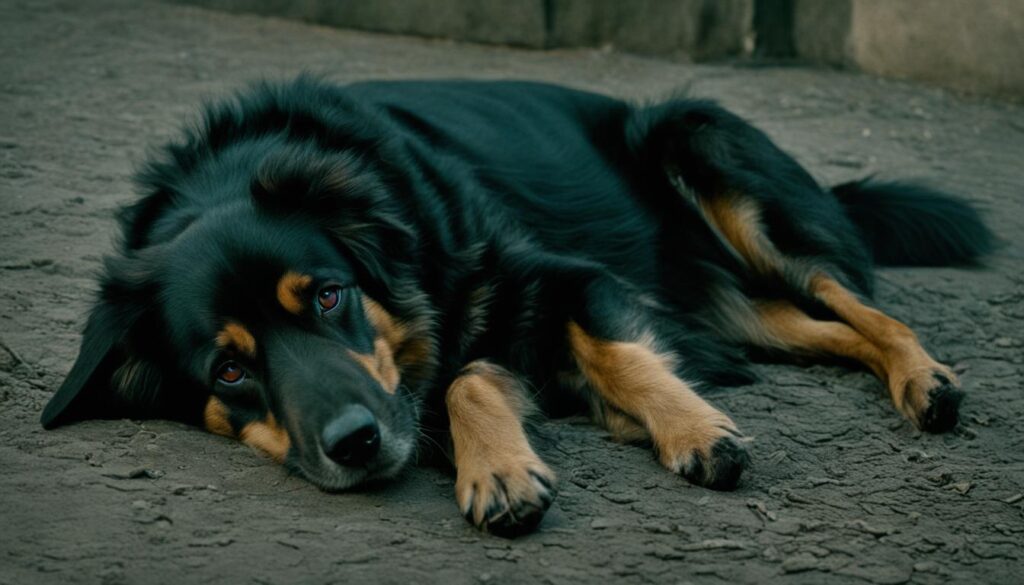
Excessive crotch licking in dogs can be a sign of underlying health problems that require attention. Some of the common reasons for excessive crotch licking include:
- Urinary Tract Infections
- Allergies (Both food and environmental)
- Yeast Infections
- Impacted Anal Glands
- Vaginitis
These conditions can cause discomfort, irritation, itching, and inflammation in the genital area, leading to excessive licking as a way to alleviate the symptoms. It is important to identify and treat the underlying cause to alleviate the dog’s discomfort and resolve the excessive licking behavior.
| Health Problems | Symptoms |
|---|---|
| Urinary Tract Infections | • Frequent urination • Pain or difficulty urinating • Blood in urine • Foul-smelling urine |
| Allergies (Food or Environmental) | • Itching • Redness • Swelling • Skin rashes |
| Yeast Infections | • Itching • Redness • Discharge • Odor |
| Impacted Anal Glands | • Scooting or dragging the anus on the ground • Licking or biting the anal area • Discomfort or pain |
| Vaginitis | • Vulvar swelling • Redness • Discharge • Frequent urination |
Signs that crotch licking is cause for concern
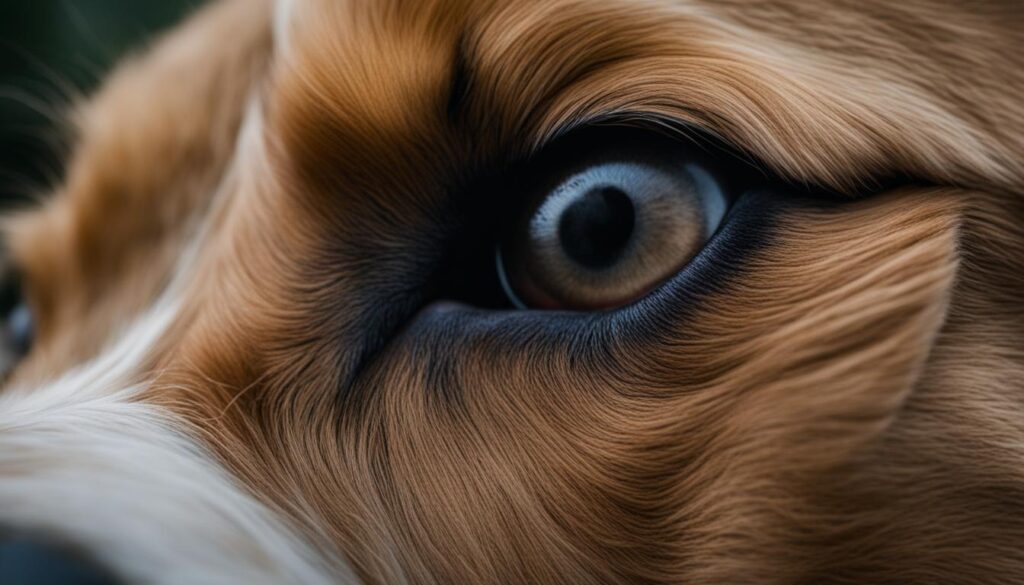
If a dog’s crotch licking becomes excessive or persistent, it is important to be aware of signs that indicate a potential health issue. These signs include:
- Swelling or redness in the genital or anal area
- Increased frequency of urination
- Scooting or rubbing the anal area on the ground
- Presence of discharge or swelling in the genital or anal area
- Foul odor from the crotch
- Discoloration or a rash on the skin in the crotch area
If any of these signs are observed, it is recommended to consult a veterinarian for further evaluation and appropriate treatment.
Encouraging the Behavior
As dog owners, it is important for us to understand that licking their private parts is a normal behavior for dogs. In fact, it is a key part of their natural grooming instincts and hygiene maintenance. Dogs groom themselves, including their genital area, to keep clean and remove any dirt or discharge. Accepting this behavior and recognizing its significance is crucial for ensuring our pets’ well-being.
Cleaning behavior is a fundamental aspect of dog grooming, and licking their private parts is just one of the ways they accomplish this. Instead of discouraging or shaming dogs for engaging in this behavior, it is more productive to redirect their attention to other activities or provide rewards for positive behaviors. This will help shape their behaviors while still acknowledging and accepting their natural grooming instincts.
By accepting and encouraging their natural behavior, we create an environment that fosters their overall well-being and psychological health. It is important to remember that dogs do not experience the same social stigmas or embarrassment as humans do. For them, this is a normal part of their routine and is essential for their cleanliness and comfort.
While it is understandable that some dog owners may find this behavior uncomfortable or embarrassing, it is crucial to remember that this is a normal behavior for our canine companions. Instead of trying to change or suppress this behavior, we can focus on providing a positive and supportive environment for our dogs.
Taking a moment to observe and appreciate our dog’s natural instincts can deepen our understanding of their behavior and strengthen the bond we share with them. So let us embrace and cherish our furry friends and their unique ways of staying clean and healthy.
Benefits of Accepting Natural Grooming Behavior
- Enhances the dog-owner bond
- Promotes a positive and inclusive environment
- Boosts the dog’s confidence and well-being
- Reduces stress and anxiety
- Fosters a healthy grooming routine
Testimonials
“Understanding and accepting my dog’s grooming behaviors has made a significant difference in our relationship. Instead of trying to change her, I now appreciate her natural instincts and focus on providing a supportive environment.”
– Sarah Johnson, Dog Owner
“I used to worry about my dog’s crotch licking, but after learning that it is a normal behavior, I have embraced it. Now, I redirect her attention to other activities while acknowledging her grooming instincts. We are both happier for it!”
– Michael Thompson, Dog Owner
| Accepting Natural Grooming Behavior | Discouraging Natural Grooming Behavior |
|---|---|
| Supports the dog’s well-being | Creates confusion and stress for the dog |
| Strengthens the dog-owner bond | Strains the dog-owner relationship |
| Encourages a healthy grooming routine | Creates a negative environment for the dog |
Other Solutions and Considerations
In addition to addressing potential health issues, there are other factors to consider when dealing with excessive crotch licking in dogs. Blocked anal glands can cause discomfort and need to be drained by a veterinarian. Allergies, both food and environmental, should be identified and managed to prevent irritation and itching. Regular deworming is important to keep dogs comfortable in the anal area and reduce the risk of transmission to humans. If excessive licking persists despite no physical problem, it may be an emotional reaction, and seeking help from a professional animal behaviorist can provide guidance and support.
Table: Common Solutions for Excessive Crotch Licking
| Issue | Solution |
|---|---|
| Blocked Anal Glands | Drainage and treatment by a veterinarian |
| Allergies | Identify and manage food and environmental allergens |
| Deworming | Regular treatment to prevent discomfort |
| Emotional Reaction | Seek help from a professional animal behaviorist |
Wrapping Up
Understanding and accepting the reasons behind why dogs lick their privates is crucial for dog owners. This behavior is rooted in their natural grooming instincts and hygiene maintenance. While excessive or sustained licking may indicate underlying health issues, it is important not to discourage or feel embarrassed by their normal grooming behavior.
By recognizing the purpose of this behavior and staying vigilant for signs of potential problems, dog owners can provide better care for their pets and ensure their overall well-being. It is essential to be proactive in identifying any signs of discomfort or medical issues related to excessive licking in the genital or anal area.
Accepting that licking their privates is a normal behavior for dogs helps us appreciate their natural instincts. Redirecting their attention to other activities or providing positive reinforcement for desirable behaviors can help shape their behavior without suppressing their grooming instincts.
FAQ
Is it normal for dogs to lick their private parts?
Yes, dogs licking their private parts is a normal grooming behavior. It is a way for them to clean their genital area after eliminating waste.
When is licking private parts considered a problem?
Excessive or sustained licking of the urogenital area may indicate a medical problem. Signs of a potential issue include swollen or red genital or anal regions, presence of pustules or red bumps, discoloration of the skin, straining to urinate, increased frequency of urination, scooting or rubbing of the rectal area, foul odor between eliminations, and discharge from the genitals.
What are the medical reasons that cause dogs to excessively lick their private parts?
Common conditions that can prompt excessive licking include urinary tract infections, bladder stones or crystals, allergies (both food and environmental), skin infections (bacterial or yeast), and anal gland impaction. Each condition may require specific treatment, including antibiotics, special diets, topical treatments, or surgical removal of the anal glands in severe cases.
Why do dogs lick their private parts to stay clean?
Dogs groom themselves, including their genital area, as a way to stay clean. Licking is their natural instinctive behavior to keep their private parts free from dirt and discharge.
What are the reasons for excessive crotch licking in dogs?
Excessive crotch licking in dogs can be caused by urinary tract infections, allergies (both food and environmental), yeast infections, impacted anal glands, and vaginitis. These conditions can cause discomfort, itching, pain, and inflammation in the genital area, leading to excessive licking as a way to relieve the symptoms.
What are the signs that excessive crotch licking in dogs is cause for concern?
Signs indicating a potential health issue include swelling or redness in the genital or anal area, increased frequency of urination, scooting or rubbing the anal area on the ground, presence of discharge or swelling in the genital or anal area, foul odor from the crotch, and discoloration or a rash on the skin in the crotch area.
How should dog owners encourage the behavior of licking their private parts?
Dog owners should accept and understand that licking their private parts is a normal behavior for dogs. It is important not to discourage or shame dogs for engaging in this behavior. Instead, redirecting their attention to other activities or offering rewards for positive behaviors can help shape their behavior while still accepting and acknowledging their natural grooming instincts.
Are there other solutions and considerations for managing excessive crotch licking in dogs?
Yes, there are other factors to consider, such as blocked anal glands, allergies, regular deworming, and emotional reactions. If the excessive licking persists despite no physical problem, seeking help from a professional animal behaviorist can provide guidance and support.
Why is it important to understand and accept why dogs lick their privates?
Understanding and accepting why dogs lick their privates is essential for dog owners. It helps them recognize and appreciate this natural behavior rooted in their grooming instincts and hygiene maintenance. Acceptance can also help in better caring for their pets and ensuring their overall well-being.


